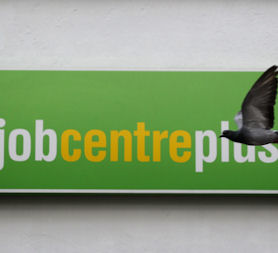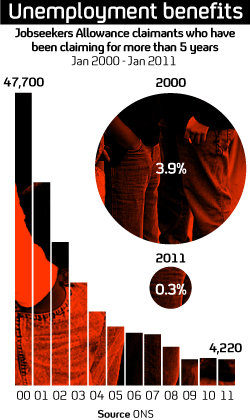Welfare reform: is benefits culture a myth?
Work and Pensions Secretary Iain Duncan Smith says “a life on benefits will no longer be an option for somebody”. But Channel 4 News has found figures suggesting that this is already the case.

The Coalition has launched the biggest shake-up of the benefits system for 60 years.
It is the brainchild of Work and Pensions Secretary Iain Duncan Smith, who said it would simplify the system, make it fairer, and encourage people to go back to work.
On BBC Breakfast, he said: “A life on benefits will no longer be an option for somebody. After all, right now there are huge numbers of people sitting on benefits, sometimes in rented accommodation that people who are working could never dream of affording.
“That system has got to change. Fairness to the taxpayer as well.”
A life on benefits will no longer be an option for somebody. That system has got to change. Iain Duncan Smith
However, Channel 4 News has obtained figures which appear to show that the concept of a lifetime on benefits is a myth – at least for those who are unemployed.
Myth?
Using figures from the Office of National Statistics, it seems that the number of people claiming unemployment benefits long-term has fallen ten fold over the last decade.
Of the 1.5m people claiming Jobseeker’s Allowance in January 2011, just 0.3 per cent had been claiming for five years or more – 4,220 people.

Just over a decade earlier, in January 2000, 47,700 people claiming Jobseeker’s Allowance had been claiming it for five years or more. This represents a much higher percentage – 3.9 per cent – of the total number of claimants, which then stood at 1.2m.
Labour’s Shadow Secretary of State for Work and Pensions, Liam Byrne, told Channel 4 News: “Lord Freud himself [Minister for Welfare Reform] said Labour’s progress on welfare reform was ‘remarkable’.
“But the key lesson of the last 10 years is that welfare reform works best when it comes with job creation. That’s the lesson this new Government is refusing to learn.”
The figures raise questions over the entire concept of a “life on benefits”, at least for the unemployed, which Mr Duncan Smith and the Prime Minister David Cameron are keen to end.
As the process of getting people back into work also seems to have been working over the last ten years, leading to less people claiming Jobseeker’s Allowance long-term, it also raise the question of whether out-of-work benefits need such radical reform.
What nobody disagrees with is that there are too many people who were left on benefits with no expectation of getting back to work. Spokesman for the Department for Work and Pensions
While the figures do not take into account people who get work briefly, before going back into the benefits system, it does show a significant drop in the numbers of a hardcore group of long-term claimants, those who are not even attempting to get back into the employment pool.
A Department for Work and Pensions spokesman said: “People who are on JSA would be expected to move into work as the regime was designed with that in mind. But too often people would then come back into the system rather than staying in continual work. What we want to ensure is that people get the right help and support they need through the Work Programme to get the skills needed to get in work and stay in work.
“What nobody disagrees with is that there are too many people who were left on benefits with no expectation of getting back to work and we are changing the system so that the focus is on what you can do and not what you can’t.
“The Welfare Reform bill and Universal Credit will mean that for the first time work will pay for some of the poorest people in this country. With the help and support of the Work Programme, people will be able to leave benefits and get into the workplace, knowing they are better off in work than on benefits.”
See the full figures here
-
Latest news
-
‘Authentic Stupidity’: Ben Elton’s new show explores how idiotic human beings can be5m

-
Is Israel’s evacuation of Rafah the precursor to full scale invasion?3m

-
Eurovision: Non-binary artist wins for first time2m

-
Tens of thousands march in Georgian capital against ‘foreign agents’ bill2m

-
‘Russia’s number one goal is to get troops closer to Kharkiv,’ says Ukrainian security analyst4m

-




